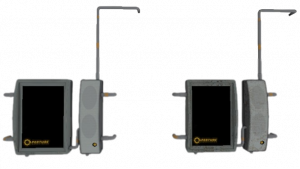Creating Portal Speakers: Difference between revisions
No edit summary |
No edit summary |
||
| Line 16: | Line 16: | ||
If the speaker is inside an Observation Hallway set its skin to 0. If the speaker is a maintenance area, set its skin to 1. | If the speaker is inside an Observation Hallway set its skin to 0. If the speaker is a maintenance area, set its skin to 1. | ||
[[File:Speaker System model skin differences.png|thumb|Skin | [[File:Speaker System model skin differences.png|thumb|Skin 0 on the left, skin 1 on the right]] | ||
Create an <code>[[info_target]]</code> entity and name it to <code>glados_speaker1</code>. Put this <code>info_target</code> in the center of the speaker part of the model. | Create an <code>[[info_target]]</code> entity and name it to <code>glados_speaker1</code>. Put this <code>info_target</code> in the center of the speaker part of the model. | ||
| Line 43: | Line 43: | ||
{{bug| Although you are outside of the microphone area. It is still possible to hear yourself and the portalgun from the speaker.}} | {{bug| Although you are outside of the microphone area. It is still possible to hear yourself and the portalgun from the speaker.}} | ||
{{Fix| Create a filter that filters only the generic_actor entity, then set the env_microphone's <code>Listen Filter</code> keyvalue to the filter you created}} | |||
==Reset DSP Microphone== | ==Reset DSP Microphone== | ||
Revision as of 02:06, 24 May 2023

You can upload screenshots at Special:Upload. For help, see the Help:Images.
Introduction
This tutorial will teach you how to create speakers.
First, complete this guide Making GLaDOS speak
The Speaker
Create a prop_static entity and set its world model to models/props/speaker_system01/speaker_system01.mdl
If the speaker is inside an Observation Hallway set its skin to 0. If the speaker is a maintenance area, set its skin to 1.
Create an info_target entity and name it to glados_speaker1. Put this info_target in the center of the speaker part of the model.
Create an env_microphone entity inside of the nodraw box of the GLaDOS' generic_actor area. Enter the following properties:
| Property Name | Value |
|---|---|
| Name | glados_microphone_speaker01 |
| Start Disabled | Yes |
| Speaker target | glados_speaker1 |
| Speaker DSP Preset | 8 LOUDSPEAKER, ECHO |
Underflags, untick
Hears Combat soundsHears World soundsHears player soundsHears bullet impacts
then tick Ignores non-attenuated sounds
Listen Filter keyvalue to the filter you createdReset DSP Microphone
Create an env_microphone and enter the following properties:
| Property Name | Value |
|---|---|
| Name | glados_microphone_resetdsp |
| Start Disabled | Yes |
| Speaker target | glados_speaker1 |
| Speaker DSP Preset | 1 NO EFFECT |
Underflags, untick
Hears Combat soundsHears World soundsHears player soundsHears bullet impacts
then tick Ignores non-attenuated sounds
The Scene
Create a logic_choreographed_scene and set its Name and Scene File to what you need.
Enter the following outputs:
Starting The Scene
Usually, a trigger_once is used to start the scene. If you are using a trigger_once, enter the following outputs:
Extra
The voice lines used in the BTS areas in Portal were modified to have a "speaker" effect.
Here's a sample of a line with the speaker effect:
Retail Voice Line
Here's a sample of the same line but without the speaker effect (taken from the beta):
Beta Voice Line
According to Tim Larkin, he used the Audio Ease Speakerphone VST Plugin. Unfortunately he doesn't remember which effect(s) were used. If you found out what makes the "speaker" effect, please add it here.
